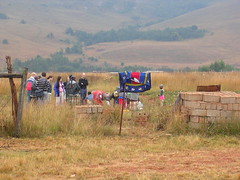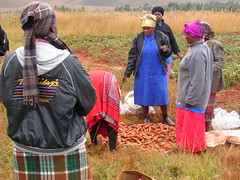
let's stop this now

On the tenth day, we went to Swaziland to visit "Swaziland for Positive Living". SWAPOL was started in 2001 for female AIDS survivors and now also focusing on orphans and vulnerable children.
Parents are dying very young which means they cannot be taught family values. Ophans cannot access food and get out abused as so many of them are out of school. In fact, as disheartening as it sounds, education is only free if they can provide the death certificate of their parents and their own birth certificates. Given those conditions are so hard to meet, school registration isn’t very common. So the Friends of Swaziland Trust provide around £40 per child each year, supported by Unite the Union in the UK.
However, on top of that, if the wife is HIV positive, she won’t get the husband’s inheritance, so instead it goes to his brother. So SWAPOL have established law clinics and mobilised widows and orphans to reclaim their homes.
 The challenge is incredible for SWAPOL. There are two nurses with one car looking after 365 chiefdoms. So they negotiated with the government to buy medication, supported by the Stephen Lewis Foundation.
The challenge is incredible for SWAPOL. There are two nurses with one car looking after 365 chiefdoms. So they negotiated with the government to buy medication, supported by the Stephen Lewis Foundation.
On International Women’s Day, they created awareness on grandmother’s programmes, HIV/AIDS, raped young girls and the judiciary, notably pushing the Deputy Prime Minister to make a commitment about the issue of grandmothers. This reminds me of an organisation called Grandparents Plus and the transformational impact that an ageing population can have.
SWAPOL want to work with other players – to raise awareness to companies who own water to improve access, to trade unions to develop their HIV/AIDs programs and spearhead democratisation in Swaziland.
We met with Stephen, who works for Skills Share Development supporting SCCCO. This is a coalition which brings together trade unions, employers, churches and lawyers at the highest level of civil society. It lobbies government on democracy and human rights and uses high level advocacy through the media (including a BBC documentary), which is especially difficult as cannot attack traditional authorities.
Citizenship in most countries is a difficult subject to engage people beyond knowing the difference between institutions. In Swaziland it’s critical to change the culture. SSD provide civic education on how it feels to be a citizen and not a subject. They train around 40 young people and send them to the rural areas they each come from. They empower people to make up their own minds.
Political parties aren’t recognised. To stand for election, you’re invited to stand by the chief who is appointed (and can be expelled) by the king. However, for the elections coming up, by the time SADC and AU observers come, only the loyalists will be in place.
Civil society is riven by rivalries and NGOs are trying to achieve their own ends. The UNDP won’t support the coalition as could be perceived as anti-government. We could argue that they won’t know what civil society needs until they begin that conversation.
Swaziland is in a dire situation. It is second to Zimbabwe in the most unhappiest countries in the world. There has been six years of drought due to the manipulation of access to water. Women and children do not have the right to self-determination. Government spends more on foreign travel than on education. The government has built the country like a rooster, all it would take is a fox to break in.
Go on http://swazimedia.blogspot.com and http://swazisolidaritynetwork.blogspot.com.
 A big question for me is how can civic society coalitions campaign on issues (which by definition would criticise government in oppressed states) and be eligible to get international funding? In practice, we know the answer is they can’t as it’s seen as political, but surely it doesn’t make sense and we should be lobbying those international institutions to confront them with this reality?
A big question for me is how can civic society coalitions campaign on issues (which by definition would criticise government in oppressed states) and be eligible to get international funding? In practice, we know the answer is they can’t as it’s seen as political, but surely it doesn’t make sense and we should be lobbying those international institutions to confront them with this reality?
We need to apply pressure on the EU for how they fund and understand civil society needs in oppressed states. They have done so in the past, for example in Northern Ireland, asking them firstly what the local needs are, then fund projects to help tackle those needs. We need to get the European Union to apply their “peacebuilding” model used in EU member states, to countries outside, particularly in politically oppressed countries.
Where Zimbabwe goes, Swaziland will follow, if we don’t stop this now.








0 comments:
Post a Comment